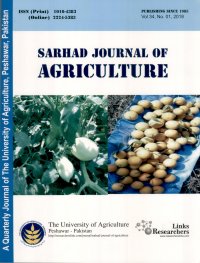Quality and Yield of Wheat Grown Under Organic and Inorganic Nutrients Management
Quality and Yield of Wheat Grown Under Organic and Inorganic Nutrients Management
Kainat Bibi1*, Sajjad Khan1, Zulfiqar Ali Gurmani1, Fahad Karim Awan1 and Sajid Ali2
ABSTRACT
Organic agriculture is a climate friendly and sustainable farming system to produce quality foods. An experiment on comparison of organic and inorganic wheat production was designed to study the field performance and quality of wheat grown under two regimes. The experiment was carried out at National Tea and High Value Crops Research Institute (NTHRI) Shinkiari, Mansehra, Khyber Pakhtunkhwa, Pakistan in 2019. Seven wheat cultivars (Atta Habib, Faisalabad, ASS, Punjab 2011, Lasani, NARC-11 and Pakistan-13) were sown using randomized complete block design (RCBD) with three replications. Source of organic manure was compost, poultry manure and farm yard manure while for inorganic treatments commercial fertilizers urea and di-amonium phosphate fertilizers were applied at recommended doses. Data was recorded on various morphological, yield and quality parameters. The result revealed that organically sown wheat varieties took more days to anthesis and maturity while more tillers, biological yield, grains yield and leaf area were recorded in inorganic treatments. Quality of organic produced wheat was comparatively better than inorganic wheat as more 13.67 % more crude protein and 2.41 % more crude fiber fat were recorded in organically grown wheat. Therefore, for high quality and environment safe production of wheat, organic fertilizer may be applied at recommended rates (compost 12 t ha-1, poultry manure 6 t ha-1 and farmyard manure (12.5 t ha-1).
To share on other social networks, click on any share button. What are these?







